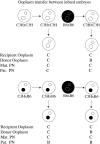Hybrid vigor and transgenerational epigenetic effects on early mouse embryo phenotype
- PMID: 18562704
- PMCID: PMC2844494
- DOI: 10.1095/biolreprod.108.069096
Hybrid vigor and transgenerational epigenetic effects on early mouse embryo phenotype
Abstract
Mouse embryos display a strain-dependent propensity for blastomere cytofragmentation at the two-cell stage. The maternal pronucleus exerts a predominant, transcription-dependent effect on this phenotype, with lesser effects of the ooplasm and the paternal pronucleus. A parental origin effect has been observed as an inequality in the cytofragmentation rate of embryos produced through genetic crosses of reciprocal F(1) hybrid females. To understand the basis for this, we conducted an extensive series of pronuclear transfer studies employing different combinations of inbred and F(1) hybrid maternal and paternal genotypes. We find that the parental origin effect is the result of a transgenerational epigenetic modification, whereby the inherited maternal grandpaternal contribution interacts with the fertilizing paternal genome and the ooplasm. This result indicates that some epigenetic information related to grandparental origins of chromosomes (i.e., imprinting of chromosomes in the mother) is retained through oogenesis and transmitted to progeny, where it affects gene expression from the maternal pronucleus and subsequent embryo phenotype. These results reveal for the first time that mammalian embryonic development can be affected by the epigenotype of at least three individuals. Additionally, we observe a significant suppression of fragmentation by F(1) hybrid ooplasm when it is separated from the F(1) hybrid maternal pronucleus. This latter effect is a striking example of heterosis in the early mammalian embryo, and it provides a new opportunity for examining the molecular mechanisms of heterosis. These results are relevant to our understanding of the mechanisms of epigenetic effects on development and the possible fertility effects of genetic and epigenetic interactions in reproductive medicine.
Figures







Similar articles
-
Maternal factors controlling blastomere fragmentation in early mouse embryos.Biol Reprod. 2005 Mar;72(3):612-8. doi: 10.1095/biolreprod.104.035444. Epub 2004 Nov 10. Biol Reprod. 2005. PMID: 15537860
-
Effects of ooplasm transfer on paternal genome function in mice.Hum Reprod. 2009 Nov;24(11):2718-28. doi: 10.1093/humrep/dep286. Epub 2009 Aug 6. Hum Reprod. 2009. PMID: 19661122 Free PMC article.
-
Early transcription from the maternal genome controlling blastomere integrity in mouse two-cell-stage embryos.Am J Physiol Cell Physiol. 2010 May;298(5):C1235-44. doi: 10.1152/ajpcell.00393.2009. Epub 2010 Jan 27. Am J Physiol Cell Physiol. 2010. PMID: 20107036 Free PMC article.
-
Epigenetic modifications and reprogramming in paternal pronucleus: sperm, preimplantation embryo, and beyond.Cell Mol Life Sci. 2017 Jun;74(11):1957-1967. doi: 10.1007/s00018-016-2447-z. Epub 2017 Jan 3. Cell Mol Life Sci. 2017. PMID: 28050628 Free PMC article. Review.
-
The contribution of human sperm proteins to the development and epigenome of the preimplantation embryo.Hum Reprod Update. 2018 Sep 1;24(5):535-555. doi: 10.1093/humupd/dmy017. Hum Reprod Update. 2018. PMID: 29800303 Review.
Cited by
-
The imprinted polycomb group gene Sfmbt2 is required for trophoblast maintenance and placenta development.Development. 2013 Nov;140(22):4480-9. doi: 10.1242/dev.096511. Epub 2013 Oct 23. Development. 2013. PMID: 24154523 Free PMC article.
-
A Role for CHH Methylation in the Parent-of-Origin Effect on Altered Circadian Rhythms and Biomass Heterosis in Arabidopsis Intraspecific Hybrids.Plant Cell. 2014 Jun;26(6):2430-2440. doi: 10.1105/tpc.113.115980. Epub 2014 Jun 3. Plant Cell. 2014. PMID: 24894042 Free PMC article.
-
Food Safety, Animal Health and Welfare and Environmental Impact of Animals derived from Cloning by Somatic Cell Nucleus Transfer (SCNT) and their Offspring and Products Obtained from those Animals.EFSA J. 2008 Jul 24;6(7):767. doi: 10.2903/j.efsa.2008.767. eCollection 2008 Jul. EFSA J. 2008. PMID: 37213844 Free PMC article. No abstract available.
-
The roles of parathyroid hormone-like hormone during mouse preimplantation embryonic development.PLoS One. 2012;7(7):e40528. doi: 10.1371/journal.pone.0040528. Epub 2012 Jul 13. PLoS One. 2012. PMID: 22808183 Free PMC article.
-
Effects of ooplasm manipulation on DNA methylation and growth of progeny in mice.Biol Reprod. 2009 Mar;80(3):464-72. doi: 10.1095/biolreprod.108.073593. Epub 2008 Dec 10. Biol Reprod. 2009. PMID: 19073997 Free PMC article.
References
-
- Brison D, Schultz RM. Apoptosis during mouse blastocyst formation: evidence for a role for survival factors including transforming growth factor alpha. Biol Reprod 1997; 56: 1088 1096 - PubMed
-
- Jurisicova A, Latham KE, Casper RF, Varmuza SL. Expression and regulation of genes associated with cell death during murine preimplantation embryo development. Mol Reprod Dev 1998; 51: 243 253 - PubMed
-
- Jurisicova A, Rogers I, Fasciani A, Casper RF, Varmuza S. Effect of maternal age and conditions of fertilization on programmed cell death during murine preimplantation embryo development. Mol Hum Reprod 1998; 4: 139 145 - PubMed
-
- Brewster JL, Martin SL, Toms J, Goss D, Wang K, Zachrone K, Davis A, Carlson G, Hood L, Coffin JD. Deletion of Dad1 in mice induces an apoptosis-associated embryonic death. Genesis 2000; 2: 271 278 - PubMed
-
- Xu J, Cheung T, Chan ST, Ho P, Yeung WS. The incidence of cytoplasmic fragmentation in mouse embryos in vitro is not affected by inhibition of caspase activity. Fertil Steril 2001; 75: 986 991 - PubMed
Publication types
MeSH terms
Grants and funding
LinkOut - more resources
Full Text Sources

